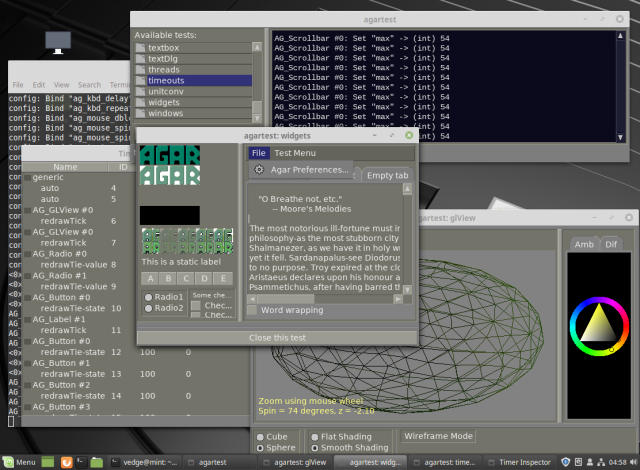Installater Agar sur MacOS - LibAgar
This guide describes how to install and use the Agar library under Mac OS. You can develop Agar applications using either Xcode or the command-line.
The following section describes the preferred method for compiling Agar from source on MacOS.
Prerequisites
Your system should have an Xcode package installed (with Xcode "Command Line Tools" included). Start up Xcode, click on "Xcode / Preferences" and bring the "Downloads" tab forward. Click on the "Install" button right of "Command Line Tools". The download may take some time.
Under MacOS the cocoa driver is the one used by default. The sdlfb and sdlgl drivers are made available if the SDL 1.2.x library or SDL framework can be found.
Compilation/Installation Procedure
First download the Agar source package and unpack it to a temporary location:
$ tar -xzf agar-1.7.1.tar.gz $ cd agar-1.7.1
Then configure and compile the sources. There are a number of build
options available (see ./configure --help) but the defaults should
be fine unless you have specific requirements.
-
--enable-debugis recommended for developer use since it enables (expensive) run-time assertions and type safety checks. - If thread safety is not required,
--disable-threadswill improve performance.
$ ./configure --prefix=$HOME # install in some alternate location $ ./configure --enable-debug # debugging features (expensive) $ ./configure --disable-threads # if multithreading is not needed $ make
Finally, install the library. This will install under the /usr/local
by default (you can use the configure option --prefix to install to an
alternate location).
# make install
You can test that Agar is working using a simple hello.c program like so:
#include <agar/core.h> #include <agar/gui.h> int main(int argc, char *argv) { AG_Window *win; if (AG_InitCore(NULL, 0) == -1 || AG_InitGraphics(0) == -1) { AG_Verbose("Init failed: %s\n", AG_GetError()); return (1); } win = AG_WindowNew(0); AG_LabelNew(win, 0, "Hello, world!"); AG_WindowShow(win); AG_EventLoop(); return (0); }
Compile this example using:
$ cc -o hello `agar-config --cflags` hello.c `agar-config --libs`
The tests directory contains an interactive test suite named agartest:
$ cd tests $ ./configure && make # make install $ open agartest.app


